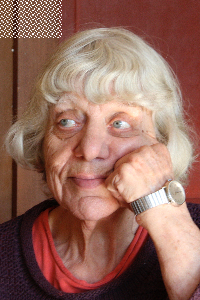

Helen Duberstein Lipton passed away peacefully on September 2, 2020 in North Truro. She was surrounded by her beloved daughters, Jackie and Irene, and close family, at Irene’s home, where she had been living since March. She was a writer and artist, ahead of her time in many ways, and leaves behind a rich legacy in her work and the memory of the many who loved her.
Born in the Bronx on June 3, 1926, to Bessie Lieberman and Jacob Duberstein (Helen kept Duberstein as her professional name), she attended City College in 1942 at the age of sixteen. Initially she was an engineering student, one of two women, before transferring to literature. City College was a center of a great deal of intellectual activity. She became friends with many of the writers, intellectuals, poets, and artists who were actively questioning societal and political structures, some of whom became well-known. She formed many important friendships there, including one with Paul Goodman (writer, anarchist, and one of the founders of Gestalt Therapy), and with his encouragement became a poet. She also met Julian Beck there, and later was involved in the early years of the Living Theater, the first experimental avant-garde theater group in this country. And, most significantly, it was there that Helen met her beloved future husband, Victor Lipton, a writer and intellectual.
Also, in 1942, Goodman urged Helen to visit Provincetown. At that young age, she hitchhiked from the Bronx with a friend and spent the summer in a room rented from a Portuguese family on Montello Street. When she complained to Victor of all the walking she had to do to get to her job on the far East End, he found a way to send her his bicycle on the freight train that still came to the center of town. It was an effective method of courtship.
In 1949, when Helen and Victor married, they both left behind the conservative religious Jewish homes they grew up in and set up their own very progressive and unconventional one, focused on building a life of art and ideas, with strong friendships adding to the family they created with the birth of daughter Jackie in 1950, and Irene Judith in 1955. Their children grew up in a home full of love, where art was considered a way of living in the world. Both daughters would become painters.
In 1970, Helen and her family were one of the first groups of residents to move into Westbeth, the artist housing complex in the West Village. Throughout their marriage they enjoyed many full summers in Provincetown, and had a circle of close artist friends there. They never bought a house in all that time—Helen finally fulfilled her dream of owning a home there at the age of 84. A native New Yorker, she spent much of her last decade living in the other place that she considered home, Provincetown.
In addition to the focus on their work as writers, they both were teachers in the NYC schools. Helen was one of the first to independently develop methods to teach reading to children who had special needs, well before special education existed. She was also very active in the antiwar movement of the ‘60s.
Helen identified early on as feminist and always defied the convention of what was expected of a woman in the fifties and sixties, and was very vocal about the disparity between the sexes. She never conformed to the standard roles of mother and wife. She loved teaching but also worked in order to give the same salary to a housekeeper and caregiver for her children. She always maintained a ‘room of her own’ to work on her writing in the evenings, and later had a writing studio in the West Village.
She authored many books of poetry, including The Voyage Out, Arrived Safely, The Human Dimension, and The Shameless Old Lady; and novels, including A Thousand Wives Dancing (the story based in Provincetown), and Roma. Her novel, A Dream of Rewards, was nominated for the Pushcart Press 10th Annual Editors’ Choice Award. Her fiction, poetry, reviews and articles have appeared in many journals, including the New Republic, the Village Voice, Commentary, and Liberation. Several of her books included her drawings.
Helen was a member and playwright-in-residence at the Circle Repertory Theater in NYC in its early years. Her play, Time Shadows, was produced in 1969, directed by founder Marshall W. Mason, and starred Tanya Berezin. Helen was one of the founding members of the Westbeth Playwrights Feminist Collective, and had many plays produced Off-Off Broadway at the Theatre for the New City in the 70s and 80s. Her plays have been performed by many experimental theater companies throughout the United States, Europe, and South America. Her book of poetry, The Shameless Old Lady, was adapted as a performance piece with music and dance.
Travel was very important to Helen. In addition to summers in Provincetown, she and Victor spent many in France, Greece, Italy, and Spain. She received several artist residencies, including Yaddo in NY, the Ucross Foundation in Wyoming, and one in Hawaii.
Helen continued to write and actively engage with community and theater until close to the end of her life. She was predeceased by her husband, Victor Lipton, and her brother, Morton Duberstein, and leaves behind her daughters, Jackie Lipton and husband J. C. Bolton of New York City and Irene Lipton and husband Phil Smith of North Truro, and her devoted dog, Kafka.
Donations in her memory may be made to the Provincetown Theater, 238 Bradford St, Provincetown, MA 02657 or to KIND (Kids in Need of Desks, 125 Maiden Lane, New York, NY 10038).